TW Review by Grace Hwang Lynch
What Amy Chua’s Manifesto About Asian Parenting Really Means
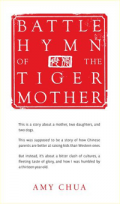 Battle Hymn of the Tiger Mother by Amy Chua (Penguin, 2011, 237 pp., $25.95).
Battle Hymn of the Tiger Mother by Amy Chua (Penguin, 2011, 237 pp., $25.95).
Ingratitude: The Debt-Bound Daughter in Asian American Literature by erin Khuê Ninh (New York University Press, 2011, 224 pp., $23.00).
I Love Yous Are for White People: A Memoir by Lac Su (Harper Perennial, 2009, 272 pp., $14.99).
The year 2011 may officially belong to the Rabbit, but it will probably go down in history associated with a more aggressive member of the Chinese zodiac: the Tiger. It will certainly be remembered by Asian Americans as the year Yale law professor Amy Chua ripped open old wounds and revived model-minority stereotypes with her now-infamous memoir Battle Hymn of the Tiger Mother—just in time for that Lunar New Year banquet with the ‘rents.
Many Asian American writers immediately decried Chua as sort of an Uncle Tom in Dragon Lady clothing, pandering to the worst stereotypes of Asian youth and popularizing a caricature of the Chinese mother—prompting nearly every Asian American employed at a media outlet (or with a Blogger account) to type up a response.
While I cringe at the crass showmanship of the “Tiger Mother”—Chua brags that her daughters were never allowed to attend a sleepover or have a playdate—I can’t help but acknowledge the germ of truth in her portrayal. Mother-daughter tension has been a central theme in Asian American literature going back to classics like Amy Tan’s The Joy Luck Club (1989), Maxine Hong Kingston’s The Woman Warrior (1975), and Jade Snow Wong’s Fifth Chinese Daughter (1945). As a second-generation Taiwanese American, I’ve experienced this brand of family friction myself.
Still, I find Chua’s book misleading enough that I’m dismayed to see her become the poster child of so-called “Chinese parenting.” Her emphasis on the superiority of her parenting techniques over the laxer ones of Western parents (a term she’s careful to qualify as “not referring to all Western parents”) has proven to be a great way to inflame controversy and sell books. But it distorts these techniques as a form of elite-class one-upmanship rather than portraying them as more typical of an immigrant family struggling to find its footing in a new land.
Two other recently released books—Ingratitude: The Debt-Bound Daughter in Asian American Literature and I Love Yous Are for White People—offer a clearer, more representative picture of Chinese parenting. They provide the necessary context for Chua’s story and illuminate why being a real Tiger Mom or Dad is more complicated than hectoring kids with Confucian ideology.
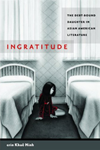 The Successful-Child Factory
The Successful-Child Factory
Released this spring, erin Khuê Ninh’s Ingratitude is an academic book that explores Asian American mother-daughter relationships—and the underlying resentments they can involve—against a larger societal backdrop.
Ninh, an Asian American studies professor, takes a close look at early works like Fifth Chinese Daughter and The Woman Warrior as well as more recent memoirs such as Evelyn Lau’s Runaway: Diary of a Street Kid (1995).
Ingratitude is a jargon-heavy read, and its chapter titles can be difficult to decipher (“Refractions of Harm,” “The Caring of Jailers”), but Ninh makes important points that are rarely heard in mainstream discussions of Asian American literature and culture. For example, in her first chapter, “The Filial Debtor,” she describes The Woman Warrior as a story in whichchildren (in the interest of helping the entire family succeed in America) are made to feel they owe it to their parents to do well. Ninh writes:
Kingston’s narrator expresses an anxiety to be ‘worthy of eating the food’…, to do something ‘big and fine’ (presumably to earn her keep)…or else [her] parents would sell [her].”… Remarkable here are not only the child’s consent that her worth ought to outweigh the cost of her upkeep, but her despair that her credits may never in fact outstrip her galloping debts in the parental balance sheet.
Ninh doesn’t address Chua’s book, which came out as her own was nearing the final stages of publication, but her insights are uncanny. Ingratitude makes clear that much of Asian American literature has been built on airing grievances against this kind of stereotypical Asian parent—not unlike the parent Chua casts herself as in Battle Hymn of the Tiger Mother.
Chua’s parenting, described in tedious and sometimes painful detail, revolves around her efforts to shape her two daughters into Julliard-trained, Carnegie-Hall-worthy classical pianists and violinists. Sophia and Lulu’s successes in music and in life are largely ascribed to their mother’s focused attention.
Hence the long hours of practice even during the family’s frequent international vacations and the much-discussed scenes in which Chua delays dinner until 9 p.m. to squeeze in three more hours of practice; tears up a daughter’s handmade birthday card, reprimanding her for lack of effort; and calls one daughter “garbage” to the horror of dinner guests.
Chua presents these choices as necessary to prevent Sophia and Lulu from becoming “soft, entitled” children. Yet, later Chua glowingly describes the dress she bought for Sophia’s reception after her Carnegie Hall performance (“a charcoal satin floor-length gown from Barneys New York—no David’s Bridal for this one!”) and the extensive menu she ordered for the event (“a raw oyster bar, iced silver bowls of jumbo shrimp”), for which she rented the Fontainebleau Room at the St. Regis New York. She apparently sees no contradiction between scenes like these and her insistence that preventing entitlement is the goal of her extreme parenting methods.
But readers might.
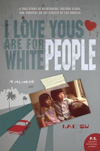 Food for Thought
Food for Thought
Extreme parental strictness is also detailed in the memoir I Love Yous Are for White People but under much different circumstances. Author Lac Su is a Chinese-Vietnamese American who fled the fall of Saigon as a young boy.
Raised in an impoverished Los Angeles neighborhood, Su recalls how his father—a busboy in a Chinatown restaurant—not only withheld meals to push extra study time but forced him to eat an entire calf’s brain each Saturday, telling him, “It will make you smart and take away all of those stupid demons from your head that keep you from memorizing your multiplication tables”:
I spend the next half hour gorging myself on cow brain. I scoop and stuff massive chunks down my throat, only to gag and retch half of them back onto the plate. I have to eat the whole thing to go out and play, so I scoop them up off the plate and try again. I munch away with my eyes closed, inhaling deeply before each swallow.
This scene is repeated every Saturday morning until the third grader breaks out in hives after eating a cow brain (his last).
Other scenes where the young Lac is beaten or belittled are interlaced with heart-wrenching descriptions of the family’s living conditions. The grungy hallways of their low-income apartment building are littered with used condoms. Su’s father comes home bloodied and bruised, having suffered a beating by gangsters while riding his bike from the restaurant after dark. While Su never uses poverty as an excuse for physical or mental abuse, the father’s desperate attempts for a better life almost evoke sympathy.
The crucial factor of socioeconomic status that drives these methods is never addressed in Battle Hymn of the Tiger Mother. The academics-or-die “Chinese” model Chua espouses is largely the modus operandi of the immigrant striving for self-preservation.
It was a lesson reinforced in my own childhood. “Don’t be an English major,” my mother warned me, as she watched me doodle in my notebooks or stay awake to finish the “Little House” books. “You won’t make much money. And if there’s a war, you might lose your job or get killed.”
Like many immigrants, my parents had seen people leave careers as journalists or lawyers in their homeland only to be sidelined by lack of language skills and local credentials in America, forced to open a hamburger shop or drive a taxi for a living. The safest bet for the upwardly mobile immigrant is to pursue skills that are not dependent on linguistic or cultural fluency: science, engineering, medicine, classical music.
This matters most to the influx of Asians who entered the United States after 1965, when Congress lifted quotas on immigrants from Asia—provided they had graduate student visas or necessary skills, notably in science or engineering. Chua herself is the daughter of legendary U.C. Berkeley electrical engineering professor Leon Chua, known as the “father of circuit theory.”
In contrast, Chua’s daughters are third-generation Asian Americans, mixed race (her husband is white and Jewish), and the offspring of two Ivy League law professors; they are already among the most privileged class in America. While taking her younger daughter Lulu to an audition at Juilliard, Chua notes that all the other parents are Asian. She also observes that most of them are either foreigners or immigrants and that “music was a ticket for them….”
Reading this passage for the first time, I anticipated a denouement in which Chua realizes she and her daughters are not part of the striving masses. Then my hopes were dashed. The sentence concludes: “…and I thought, I’m not like them. I don’t have what it takes.”
Chua comes so close to understanding that her daughters have many opportunities and advantages beyond the meal ticket of classical music. Instead, she makes her observation and vows to soldier on, even after Lulu is rejected from Juilliard: “Lots of people don’t get in their first time. Now we know what to do for next time.”
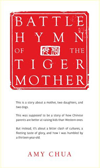 The Obligatory Epiphany
The Obligatory Epiphany
The supposed turning point in Battle Hymn of the Tiger Mother involves a later confrontation with Lulu. At the beginning of the book, Chua describes her younger daughter, born in the Year of the Boar, as someone who is “‘willful’ and ‘obstinate’ and will often ‘fly into a rage.’”
In this crucial scene, the thirteen-year-old throws a public fit during a family vacation to Russia, smashing glasses of water at a sidewalk café in Moscow’s Red Square:
‘You don’t love me,’ Lulu spat out. ‘You think you do, but you don’t. You just make me feel bad about myself every second. You’ve wrecked my life. I can’t stand to be around you. Is that what you want?’
Chua ends the next chapter with a dramatic concession: “‘Lulu,’ I said. ‘You win. It’s over. We’re giving up the violin.’” Yet though the book purports to be a story about “how I was humbled by a thirteen-year-old,” Chua’s realizations are too little, too late. She tells the reader—and her daughters—that she’s since decided on a “hybrid approach”:
‘The best of both worlds. The Chinese way until the child is eighteen, to develop confidence and the value of excellence, then the Western way after that.’
When Sophia points out the falseness of this concession (“That’s not a hybrid approach. That’s just Chinese parenting all through childhood”), Chua brushes her off as being “too technical.” But it’s clear in the closing pages that she stands firm in her self-described Chinese parenting style: “I refuse to buckle to politically correct Western social norms that are obviously stupid.”
A Complex Bond
At the end of Lac Su’s memoir, he reflects on how his father’s influence has shaped him. Despite his depictions of his father’s beatings, verbal upbraiding, and controlling behavior, he has dedicated his memoir “To Pa.” He writes:
I love my father…. I see now that he was building a bridge for me to cross from boyhood to manhood. Pa was always working on this bridge…though it was too far from being finished for me to appreciate. When I finally reached the bridge, it was there for me to cross with ease. I realize now that Pa lived in fear. He invested so much neurotic energy in making sure I’d get to the bridge because he was terrified that he would never see its completion.
After offering this appreciation, however, Su acknowledges that “[t]he painful trek to reach his bridge crippled me. Somewhere deep inside the pain will always remain.”
That’s why Battle Hymn of the Tiger Mother troubles me. Chua claims she’s been “humbled” on the book’s front cover but ends up as convinced as she was at the start that she made the best parenting choices for her kids. She even quotes her daughters to support this conclusion (Sophia: “I went along with it, by my own choice.” Lulu: “I’m glad you forced me to play the violin.”)
But this is Chua’s story, not theirs, and her obliviousness to its contradictions does nothing to illuminate the complex bonds between Asian American parents and children.
My own feelings about the “traditional” parenting methods depicted here are mixed. Such methods can be very successful at producing the desired results—prosperous, high-achieving offspring—but the collateral damage is nearly impossible to undo.
My hope is that the success of Chua’s book will bring mainstream attention to the wider body of Asian American literature. Books like I Love Yous Are for White People and Ingratitude provide deeper socioeconomic explanations for Tiger Mother fierceness. They also reveal the damage that can result from such parenting techniques—not just personally, as in Su’s story, but collectively.
As Ninh argues in Ingratitude, the angst-ridden family dynamics in Asian American literature and culture divert attention away from the community’s real struggles: those of immigrants trying to succeed in the United States. Families turn their anger inward, on themselves, instead of hurling rage at discriminatory policies that force Asian Americans to work extra hard to vye for college admissions or career advancement.
Perhaps the real story is that parents like Chua or Su’s father are teaching their children the only survival techniques they know. If a mosaic of narratives could spark the same media storm that Chua’s “battle hymn” has, then the public image of the Asian mother might be recast—not as the antagonist but simply as…Mom.
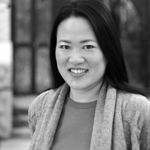 Grace Hwang Lynch is the editor of the Race/Ethnicity section of BlogHer.com. She also blogs about Asian mixed-race families at HapaMama.com.
Grace Hwang Lynch is the editor of the Race/Ethnicity section of BlogHer.com. She also blogs about Asian mixed-race families at HapaMama.com.
Grace will not be going on a European family vacation this summer. And if she did, her children would not have to practice piano at the hotel.
In this issue, TW will also publish Grace’s review of My Mom Is a Fob: Earnest Advice in Broken English from Your Asian-American Mom. Based on a popular blog by Serena Wu and Teresa Wu, it reveals another, much funnier side of the Asian American mother-daughter relationship.
